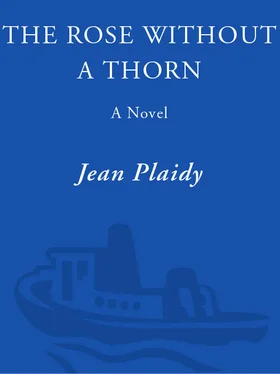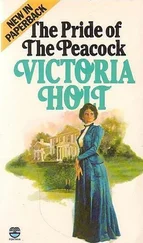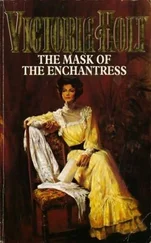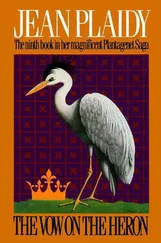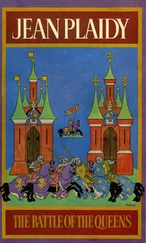Виктория Холт - The Rose Without a Thorn
Здесь есть возможность читать онлайн «Виктория Холт - The Rose Without a Thorn» весь текст электронной книги совершенно бесплатно (целиком полную версию без сокращений). В некоторых случаях можно слушать аудио, скачать через торрент в формате fb2 и присутствует краткое содержание. Жанр: Исторические любовные романы, на английском языке. Описание произведения, (предисловие) а так же отзывы посетителей доступны на портале библиотеки ЛибКат.
- Название:The Rose Without a Thorn
- Автор:
- Жанр:
- Год:неизвестен
- ISBN:нет данных
- Рейтинг книги:4 / 5. Голосов: 1
-
Избранное:Добавить в избранное
- Отзывы:
-
Ваша оценка:
- 80
- 1
- 2
- 3
- 4
- 5
The Rose Without a Thorn: краткое содержание, описание и аннотация
Предлагаем к чтению аннотацию, описание, краткое содержание или предисловие (зависит от того, что написал сам автор книги «The Rose Without a Thorn»). Если вы не нашли необходимую информацию о книге — напишите в комментариях, мы постараемся отыскать её.
The Rose Without a Thorn — читать онлайн бесплатно полную книгу (весь текст) целиком
Ниже представлен текст книги, разбитый по страницам. Система сохранения места последней прочитанной страницы, позволяет с удобством читать онлайн бесплатно книгу «The Rose Without a Thorn», без необходимости каждый раз заново искать на чём Вы остановились. Поставьте закладку, и сможете в любой момент перейти на страницу, на которой закончили чтение.
Интервал:
Закладка:
It was spring of the year 1533 when we set out for Lambeth. We should be in time for the coronation of Queen Anne, for, in spite of all the opposition and the long fight to attain his desires, the King had decided to accept the case as set out by Archbishop Cranmer, to defy the Pope and declare that he had never been married to Queen Catherine of Aragon and therefore could no longer live in sin with her. So he had married Anne Boleyn at the beginning of the year.
She was already pregnant and on the coming Whitsunday was to be crowned Queen of England.
A Silk Flower
LAMBETH WAS BEAUTIFUL in the late spring when we arrived at the Duchess’s mansion. It was built very much on the same lines as my father’s house at Lambeth but was well preserved and comfortable. There were numerous retainers and quantities of food. The gardens ran right down to the river and it was thrilling to be so close to the Court, especially at such a time.
Queen Catherine had been discarded and Queen Anne was in her place. There were many who disapproved of this, and we had to be very careful in what we said. We heard rumors concerning those who had spoken rashly and were now languishing in the Tower.
Sometimes we rode past that sinister building. Mysterious and evil happenings had taken place there. People had been sent into that grim fortress and never been heard of again. I often thought of those two little princes who were said to have been murdered there. There had been a great deal of talk about them at one time. People said they had been murdered by wicked King Richard, who had been turned from the throne by our King Henry’s father—another Henry.
But in some respects life went on in the same way as it had in Horsham. The architecture of the house being very like that other, we had a similar Long Room in which the nightly revels still took place.
Henry Manox accompanied us to Lambeth with the Duchess’s musicians; he and I had become the greatest of friends by this time and I looked forward to his company both at the virginals and in the Long Room. He told me that I was the most gifted pupil he had ever had and that he loved me dearly—but not only for that.
I missed Isabel and often wondered whether she regretted leaving the Duchess’s household. But I think she was very eager to be married.
Dorothy Barwike watched over me, and in Lambeth I met Mary Lassells. She came to the house soon after we arrived and she told me she had been nursemaid in the house of my uncle, Lord William Howard; and when Lady Howard died, the Duchess took Mary Lassells into her household as one of her waiting women.
This meant that Mary Lassells was now sleeping with the rest of us in the Long Room.
Shortly after we arrived, I suffered a disappointment, for Henry Manox left the Duchess’s service for that of Lord Beaumont. But this was soon proved to be not so bad as I had first feared, for Lord Beaumont was a close neighbor of the Duchess, and Henry could easily slip across the gardens in order to join me in the Long Room.
There was less supervision than there would be normally, because everyone was completely occupied with the coming coronation. The Duchess’s ambitions had been realized, and she left Lambeth for Court in a state of bliss. She was to hold the new Queen’s train at the ceremony of the coronation.
The weather was beautiful. Everyone said it was the best time of the year, and even before the event there were days of rejoicing, with spectacles and processions in the streets. I went out with Mary Lassells, Dorothy Barwike and some of the others who took part in the nightly revels. I was delighted that Henry Manox joined us.
It was the day before the coronation—a time when the celebrations were at their height. I had already decided that there was nothing the people like more than such occasions, and they would be overcome with love for the King because he gave them such opportunities for merry holidays.
On the river were craft of all descriptions, and from many came the sound of sweet music. As was the custom, the Queen had been staying at the Tower with the King and was now preparing for the great tomorrow.
It was the last day of May and, the weather being so perfect, people were saying that Heaven itself was showing its approval of the marriage.
Rails had been set up in the streets so that the horses, who would play such a big part in the procession, could not harm the spectators. There would be crowds of them, of course, and the streets were elaborately decorated; cloth of gold and velvet hung in the Chepe, and Gracechurch Street was brilliant in crimson velvet. I was pressed against the rail and Manox’s arm was about me while we watched the procession. There were the Archbishops of York and Canterbury with several ambassadors, and I glowed with pride when my uncle, Lord William Howard, appeared among them.
Henry Manox glanced at me and said: “You are indeed one of a noble family, are you not, sweetheart?”
I giggled, and thought of my grandmother, who was to hold the Queen’s train.
“Lord William is not the Marshal,” said Mary Lassells disparagingly, as though she did not like this reference to the Howards.
“No,” retorted Manox, “but he is standing in for his brother, who, as ambassador in France, cannot be here for this great occasion. And is not that brother, the great Duke of Norfolk, yet another uncle of our noble little companion.”
Mary looked sullen, but could not remain so for long, and she was soon exclaiming in delight, for the moment for which we had all been waiting had arrived. Here was the Queen herself.
There was a gasp through the crowd. She was in an open litter so that we could all see her clearly. It was a beautiful litter, covered with cloth of gold, drawn by two white palfreys which were led by gentlemen of the Queen’s household.
I glowed with pride when I saw my fascinating cousin, for I thought I had never seen anyone so beautiful. Her surcoat was of silver tissue lined with ermine; she wore her long dark hair loose about her shoulders, and round her head was a circlet of rubies. Four tall knights held a canopy of cloth of gold over the litter.
I felt deeply moved and wished her happiness with all my heart. Her litter had passed on and then came her attendants in their litters, and in the first of these sat my grandmother with the Duchess of Dorset.
Henry Manox threw a sly glance at Mary Lassells and squeezed me closer to him. “Marry,” he said, “our noble companion’s family is very well represented here today. ’Tis so, is it not, Mistress Lassells?”
What a happy day that was! We reveled in the pageants, liking best the fountain of Helicon from which Rhenish wine spurted in jets and fell into cups, one of which Henry Manox brought to me, and we drank together, as he said, from our loving cup.
We were all too weary at the end of the day to indulge in our usual revelries and slept soundly.
The next day was the glorious first of June; and the Queen, her train held by my grandmother, went from Westminster Hall to the Abbey, attended by a great company, including my Uncle William Howard as deputy for that other, even more illustrious uncle, the Duke of Norfolk; and there she was crowned Queen of England.
Days of rejoicing followed. There were banquets and ceremonies and joisting in the tilt-yard where the King and his new Queen sat side by side watching the display.
There would be further rejoicing to come in September when the Queen gave birth to the child she carried. It would be a boy—everyone was determined on that; and then the King’s happiness would be complete. And so would that of us all.
But it was not quite so peaceful as it had seemed. Everyone was not rejoicing, and there would always be some to make their views known, however dangerous that was.
Читать дальшеИнтервал:
Закладка:
Похожие книги на «The Rose Without a Thorn»
Представляем Вашему вниманию похожие книги на «The Rose Without a Thorn» списком для выбора. Мы отобрали схожую по названию и смыслу литературу в надежде предоставить читателям больше вариантов отыскать новые, интересные, ещё непрочитанные произведения.
Обсуждение, отзывы о книге «The Rose Without a Thorn» и просто собственные мнения читателей. Оставьте ваши комментарии, напишите, что Вы думаете о произведении, его смысле или главных героях. Укажите что конкретно понравилось, а что нет, и почему Вы так считаете.
